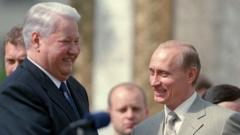In light of the 25th anniversary of Vladimir Putin's leadership, questions abound regarding his impact on Russia following Boris Yeltsin's unexpected resignation on New Year's Eve 1999. With this transfer of power, Putin, then Prime Minister, was tasked with the crucial directive from his predecessor to "take care of Russia."
Since that pivotal moment, Russia has witnessed profound transformations, particularly marked by the ongoing conflict in Ukraine. This war has brought considerable devastation to Ukraine, where cities have faced significant destruction, displacing millions and altering the demographic landscape. However, Russia, too, has experienced substantial hardships, including military losses, economic sanctions, and an increasingly oppressive domestic climate.
Reflecting on two and a half decades of Putin's governance, observers note a dramatic shift in the leader's approach. Former NATO chief Lord Robertson expressed concern over this evolution, contrasting the cooperative Putin of 2002 with today's more authoritarian ruler who denies Ukraine's sovereignty, a stark departure from his previous stance.
Within Russia, the narrative surrounding the war has been shaped by a combination of ambition and perceived victimhood. While Putin exercises power, frequently framing his actions as a defense of national sovereignty against unduly dismissive Western influences, his government faces undeniable scrutiny. Questions linger regarding whether his tenure has genuinely upheld Yeltsin’s legacy.
In an end-of-year press conference, Putin was confronted with the realities of his "special military operation" and its repercussions on the Russian populace. When asked if he believed he fulfilled Yeltsin's directive, Putin confidently claimed success in steering Russia away from peril, positioning himself as the ultimate protector of Russian sovereignty.
This contested portrayal raises deeper questions about Putin's belief in his narrative regarding Russia’s direction. As the world watches closely, the answer to this inquiry could shape the future course of both Russia and the wider geopolitical landscape.
The ramifications of Putin’s 25-year reign will likely continue to unfold as Russia navigates its place in the international community amidst war and economic strife, calling into question the true meaning of leadership in turbulent times.
Since that pivotal moment, Russia has witnessed profound transformations, particularly marked by the ongoing conflict in Ukraine. This war has brought considerable devastation to Ukraine, where cities have faced significant destruction, displacing millions and altering the demographic landscape. However, Russia, too, has experienced substantial hardships, including military losses, economic sanctions, and an increasingly oppressive domestic climate.
Reflecting on two and a half decades of Putin's governance, observers note a dramatic shift in the leader's approach. Former NATO chief Lord Robertson expressed concern over this evolution, contrasting the cooperative Putin of 2002 with today's more authoritarian ruler who denies Ukraine's sovereignty, a stark departure from his previous stance.
Within Russia, the narrative surrounding the war has been shaped by a combination of ambition and perceived victimhood. While Putin exercises power, frequently framing his actions as a defense of national sovereignty against unduly dismissive Western influences, his government faces undeniable scrutiny. Questions linger regarding whether his tenure has genuinely upheld Yeltsin’s legacy.
In an end-of-year press conference, Putin was confronted with the realities of his "special military operation" and its repercussions on the Russian populace. When asked if he believed he fulfilled Yeltsin's directive, Putin confidently claimed success in steering Russia away from peril, positioning himself as the ultimate protector of Russian sovereignty.
This contested portrayal raises deeper questions about Putin's belief in his narrative regarding Russia’s direction. As the world watches closely, the answer to this inquiry could shape the future course of both Russia and the wider geopolitical landscape.
The ramifications of Putin’s 25-year reign will likely continue to unfold as Russia navigates its place in the international community amidst war and economic strife, calling into question the true meaning of leadership in turbulent times.




















